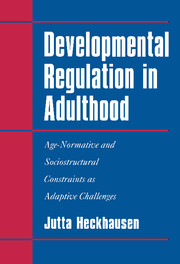 Developmental Regulation in Adulthood
Developmental Regulation in Adulthood Book contents
- Frontmatter
- Contents
- Acknowledgments
- List of Tables and Figures
- Introduction
- 1 Selectivity and Failure Compensation as Fundamental Requirements of Human Behavior and Development
- 2 The Life Course as a Context of Action
- 3 Primary and Secondary Control across the Life Span
- 4 A Model of Developmental Regulation across the Life Span
- 5 Developmental Goals as Organizers of Developmental Regulation
- 6 Developmental Regulation in Different Life-Course Ecologies
- 7 Social Comparisons as Prototypical Strategies in Developmental Regulation
- 8 Conclusions and Prospects for Future Research
- References
- Name Index
- Subject Index
5 - Developmental Goals as Organizers of Developmental Regulation
Published online by Cambridge University Press: 05 September 2009
- Frontmatter
- Contents
- Acknowledgments
- List of Tables and Figures
- Introduction
- 1 Selectivity and Failure Compensation as Fundamental Requirements of Human Behavior and Development
- 2 The Life Course as a Context of Action
- 3 Primary and Secondary Control across the Life Span
- 4 A Model of Developmental Regulation across the Life Span
- 5 Developmental Goals as Organizers of Developmental Regulation
- 6 Developmental Regulation in Different Life-Course Ecologies
- 7 Social Comparisons as Prototypical Strategies in Developmental Regulation
- 8 Conclusions and Prospects for Future Research
- References
- Name Index
- Subject Index
Summary
This chapter introduces the concept of developmental goals. Developmental goals are conceptualized as organizers of developmental regulation. An action-theoretical framework based on recent innovations in motivational action theory (H. Heckhausen 1987a, 1987b, 1987c, 1989; H. Heckhausen & Kuhl 1985) is utilized. Although motivational action theory provides the general theoretical framework for our research, action directed at development constitutes a particular case. Development-related action is embedded in and shaped by its action field, the human life course, which entails particular types of constraints. These biological, sociostructural, and age-normative constraints to life-span development were discussed in Chapter 2. This chapter examines a specific type of age-graded constraint: age-normative deadlines for the attainment of developmental goals.
I shall start with a comparison between the concept of “developmental goals” and other related concepts and, subsequently, introduce an action-phase model developed for general motivated behavior. This model will then be extended to include the concept of action deadlines and be applied to behavior directed at developmental goals.
Developmental Goals and Related Concepts
Although the early phase of revival of the life-span approach was in general characterized by a greater emphasis on explanatory or boundary factors for individual development, there were also early pioneers of the study of life-span changes in individuals' motivation and attempts to take an active part in their developmental course.
Information
- Type
- Chapter
- Information
- Developmental Regulation in AdulthoodAge-Normative and Sociostructural Constraints as Adaptive Challenges, pp. 102 - 121Publisher: Cambridge University PressPrint publication year: 1998
Accessibility standard: Unknown
Why this information is here
This section outlines the accessibility features of this content - including support for screen readers, full keyboard navigation and high-contrast display options. This may not be relevant for you.Accessibility Information
- 1
- Cited by